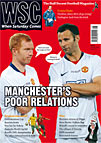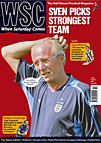 Dear WSC
Dear WSC
For a major international tournament junkie like myself, summers in the odd-numbered years are the worst of times. As such, no amount of luxury on my holidays can ease the pain of the absence of a World Cup or European Championship finals. Even allowing for Scotland’s continued inability to connect with the 21st century, I miss, nay need, a big summer football event. A mid-life crisis only makes matters worse whereby I’m forced to accept an ever-increasing gap between myself and those much younger (and of course fitter) men I choose to cheer on. Surely I’m not alone in this respect – there must be thousands of similar sad old gits out there. My solution – a biennial seniors tournament featuring players aged 40-plus. I’m talking about a chance to see superstars from yesteryear such as Dalglish, Keegan, Platini, Maradona and others who are nearer to my age group. Restrict the tournament to 16 nations with the hosts being countries unlikely to ever stage the big events such as Norway/Denmark, Wales/Ireland, Canada, Cuba. All profits to charity, a boost to local economies and a chance to travel the world with a purpose. Someone hear my plea!
Robert Marshall, Cambuslang
Search: 'J-League'
Stories
 Dear WSC
Dear WSC
Regarding Simon Cotterill’s article in WSC 269. Indeed it is rare that many J‑League clubs sell out tickets for many games but this doesn’t tell the whole story about Japanese football. First of all, the World Cup crowds were different to those at ordinary J-League games. I’m not sure if it’s the same case in England but the media strongly encouraged people to cheer on the national team, which is followed on a four-year cycle only at major tournaments or in qualifying. Secondly, J-League attendances did decrease quickly after the initial boom but a football culture is developing and the supporters who go regularly understand the game a lot more. This can be seen at Urawa Reds and Albirex Niigata who both use stadiums built for the 2002 World Cup and sell out all their home games. It’s not just Japan and Korea where there are problems with attendances – English football has them too, as can be seen at the half-empty Ewood Park or Riverside Stadium.
Kazutaka Watanabe, Atsugi, Japan
 Simon Cotterill examines the legacy of half-filled stadiums from the 2002 World Cup
Simon Cotterill examines the legacy of half-filled stadiums from the 2002 World Cup
There was dismay in Japan and South Korea when FIFA announced in 1996 that the 2002 World Cup would be shared between them. The countries’ relationship was frosty at best and the bidding war between them had been fierce, bitter and expensive. Although shocked at FIFA’s unprecedented decision, both were at least relieved that they hadn’t actually lost the vote, and so set about trying to out-do each other by pumping billions into football facilities.
 The marketing prospects Japanese players offer are causing people to overlook what a fine player Bolton have signed in Hidetoshi Nakata, believes Justin McCurry
The marketing prospects Japanese players offer are causing people to overlook what a fine player Bolton have signed in Hidetoshi Nakata, believes Justin McCurry
There was a certain inevitability about the cynicism that greeted the arrival of Hidetoshi Nakata at the Reebok Stadium. In persuading the unsettled Japan midfielder to move to Bolton from Fiorentina, Sam Allardyce had, so the received wisdom goes, ensured the club a steady income from replica-shirt sales, television coverage in the Far East and household corporate names on pitch-side sponsorship hoardings. After all, other Japanese players to have signed for Premiership clubs – remember Akinori Nishizawa and Kazuyuki Toda? – have done little to dispel the notion that they are anything more than cash cows in football boots.
 While Japan was considering imposing sanctions on North Korea, they found time to have a game of football, writes Justin McCurry
While Japan was considering imposing sanctions on North Korea, they found time to have a game of football, writes Justin McCurry
Naive idealists who believe sport and politics shouldn’t mix had best ignore the Asian qualifiers for the 2006 World Cup – that is if they weren’t already. When North Korea played Japan last month in their opening group qualifier, it wasn’t just the prospect of upsetting the best side in Asia on home turf that motivated them. It was also the thought of putting one over a bitter historical enemy.